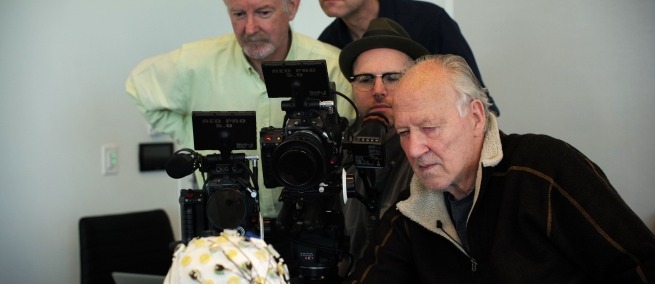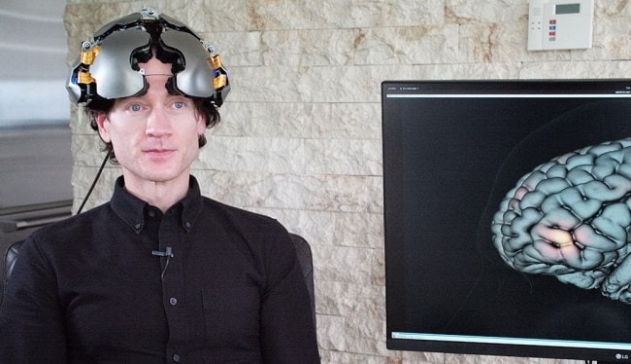
The Werner Herzog documentary, THEATER OF THOUGHT, is the latest of the filmmaker’s mind-expanding explorations of human experience. Gathering together new research by scientists at the forefront of neuroscience, it is an eye-opening education, enabled by Herzog’s warm curiosity, that broaches the use of brain-computer interfaces for people with brain injuries, among other discoveries. Largely a talking-head film, it’s dense with knowledge and peppered with Herzog’s left-field interview interventions, such as asking one scientist about fishing (which does connect to the phenomenon of fish schools and the question of telepathy).
I spoke with Herzog recently about his film, technological wonders, and the innumerable issues raised in his probing discussions. THEATER OF THOUGHT was developed with support from the Alfred P. Sloan Foundation, and opens December 13 at Film Forum.
Your films often explore human experience that’s beyond rational explanation. But in your memoir, you write that one of your earliest projects was about plasma fuel, for WQED in Pittsburgh, so the forefront of science is clearly a longstanding interest.
I’ve always been fascinated by the questions of science, and in the case of NASA, of course, the exploration of the universe. With THEATER OF THOUGHT, it is about who are we, how do we function, how do we understand ourselves, and of course, the incredible breakthroughs that have brought us to the first steps of telepathy, for example, and artificial intelligence. And questions of which reality do we live in, and just on and on. I take it all in with a total fascination. It’s like a Grand Canyon here, and a Mount Everest there. It’s fantastic—a road movie that only ends up at marvels!
You show the potential applications of these discoveries, such as the brain-computer interfaces that allow people with brain injuries to control robotics. Could you talk about the potential of these technologies for good but also maybe the dangers?
I’m showing a patient with brain damage who cannot move her arms anymore, with a robot arm that is separate from her in the room. And she can pick up a glass of water, just by thinking and wishing with intensity that the robot arm please pick up this glass and give me this drink. And we see it, we see it with our own eyes! This is phenomenal. And of course you can construct an evil side, if you have, let's say, a prison colony and you implant them with these devices and force them now to shoot each other. But it’s too far-fetched. Let’s celebrate the phenomenal advantages that we have.
THEATER OF THOUGHT explores both scientific and artistic perspectives, through your questioning. As an artist, what sort of potential did you see in these discoveries about the brain?
Well, there are deep questions that none of us can solve, and I cannot solve them either: what kind of reality are we creating in our dreams, or in cinema, our collective dreams? How do we live in a partially fabricated reality where in a way we make up our own memories? Memories are not very stable, and it's a great blessing of nature that we can embellish our memories. Otherwise, life probably would be unlivable. One of the scientists says it very bluntly, Jack Gallant [professor neuroscience at the University of California, Berkeley], who looks deep into specific functions in the brain. He says it with a very clear dictum: "There is no truth in the human brain.” This is partially alarming and also in a way for me reaffirming: meaning, look for poetry, be inventive, trust in your dreams, trust in your visions. And that's what the film is all about. My warning is not to describe it as a scientific film. It is about great joy, great visual joys, and the unbelievable things you see in there.

Still from THEATER OF THOUGHT. Courtesy of Argot Pictures.
Fascinating questions of free will come up, too. I thought that was one implication of the work of Uri Hasson, a professor at the Princeton Neuroscience Institute, and his experiments predicting what people would think of certain storytelling outcomes. Did this film change what you think about free will?
No, it doesn’t have to do with free will but with the predictability of stories. He tells you half a story, and he puts you in a brain scanner, and the way you finish a story shows you what kind of ending you are most likely to tell yourself. Which is beautiful per se, but I tell him, straightaway, that you might try to read my next film before I even make it. But number one, you will fail, and if you do not fail, your film will not be half as good as the one that I will produce for you. And we laugh! There’s a lot of joy going into all this.
Maybe it's a reflection of my fears, but there’s also something intimidating about reading speech from the brain’s activity with an implanted chip, as another experiment in the film does.
Yes, we have to handle it well. We really have to think how to do it. But at the same time, extracting certain things from your brain [can be helpful], like the coming storm for epileptic people. The first signals [of a seizure] could be read by an implanted chip, and the implanted chip gives orders to bring down the thunderstorm before it occurs. It is already partially possible, and it’s phenomenal. Or the power of human will: the woman who is paraplegic, who cannot move her arms, and she deeply wishes a robot to grab a glass of water. The chip translates her wish that she cannot perform, being paralyzed. And you see this with your own eyes.
It’s a beautiful reaction shot in the film, in a way—her smile, her profound satisfaction. A deeply emotional moment.
Exactly. It’s also about the joy that science can create.
Something about the film’s ending also suggests that it is a bit of a religious film in its implications. There’s even a shot of these little saint figurines near the end. What does this knowledge do for our belief in God?
You are asking me too much! You have to, number one, have a private audience with the Pope in the Vatican. And ask your own God in prayer to enlighten you. I cannot give you an answer. But of course, it stirs up questions of life itself, of reality, of perceptions. Are we alone as thinking creatures? Are fish thinking? And if so, what are they thinking about? How do they act in unison? Is that telepathy? For God's sake, we do not know.
You mentioned artificial intelligence earlier. I think that ChatGPT came out after the film had its festival premiere.
Yes.
Have you ever used artificial intelligence, ChatGPT, that sort of thing?
No, I have not. But interestingly enough, three young writers approached me. They had published a book of poetry written by artificial intelligence, and some of the poems are really, really good. They asked me to do the audio version of the book, if I could speak the voice of the robot. And I found it so interesting that I did it. But I said to these young writers, listen, I do not want to speak like with a robotic voice, like the voice we have heard from Stephen Hawkins, the cosmologist who was paralyzed in his wheelchair and could not speak anymore but whose voice was created artificially. I do not want to speak with a robotic, artificial voice. I want to speak with all the human pathos and human love and human emotion and empathy. That’s right [for the poems], because many of the poems hint at the robot’s wants to participate in love and wants to be recognized. It’s very, very interesting and puzzling. What is coming at us is very, very big.
That reminds me of another moment in the film when you are interviewing Professor Cori Bargmann and Professor Richard Axel together: you ask about “axioms of emotions.” What did you mean by that?
It’s like in grand opera: emotions so condensed, like in mathematics, that you cannot prove it any further. The basic foundations of the whole architecture of mathematics. In grand opera, you have emotions so condensed that they do not really appear in human nature anymore. They are too condensed—and yet credible, and yet you can participate, and audiences cry at the opera. These are emotions that are too condensed for our realities, for our lives.
After interviewing so many eminent scientists, you say in the film that, still, no one can quite explain what a thought is. What do you think a thought is?
Not a single one of these various scientists can explain what consciousness is. Nobody can! These are completely open questions. We have lived with the idea, “Oh, yeah, we know what a thought is.” No, we do not. It doesn’t matter. It should not alarm us. We can live a wonderful, beautiful life with friendship, and the Thanksgiving turkey, and love and laughter and a good glass of wine. We do not need to know exactly what defines a thought. It is as simple as that.
Does THEATER OF THOUGHT resonate for you with one of your previous films? Which film could people watch after this one?
Maybe CAVE OF FORGOTTEN DREAMS [2010], where you see people 30,000 years ago having their dreams and their own paintings and seeing reality in a way that is beautiful but not fully comprehensible for us. And yet they are us. This is the awakening of the modern human soul.
♦
FILMMAKERS
PARTNERS
TOPICS